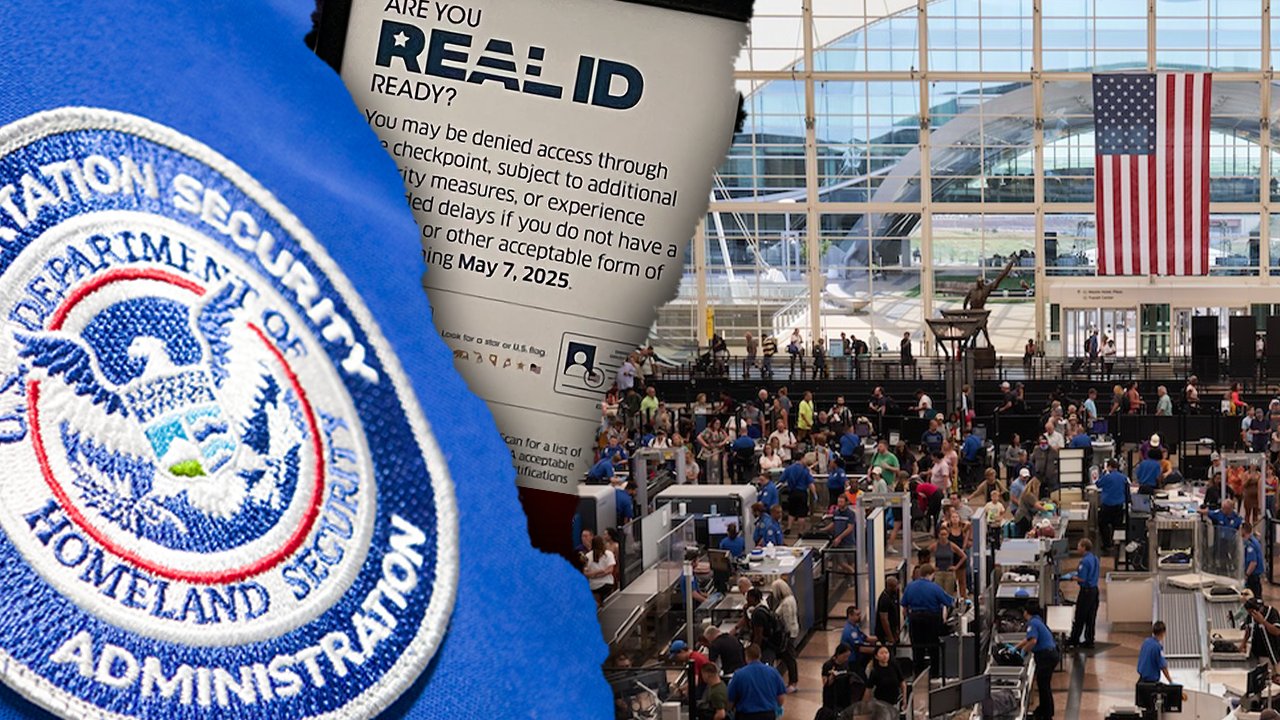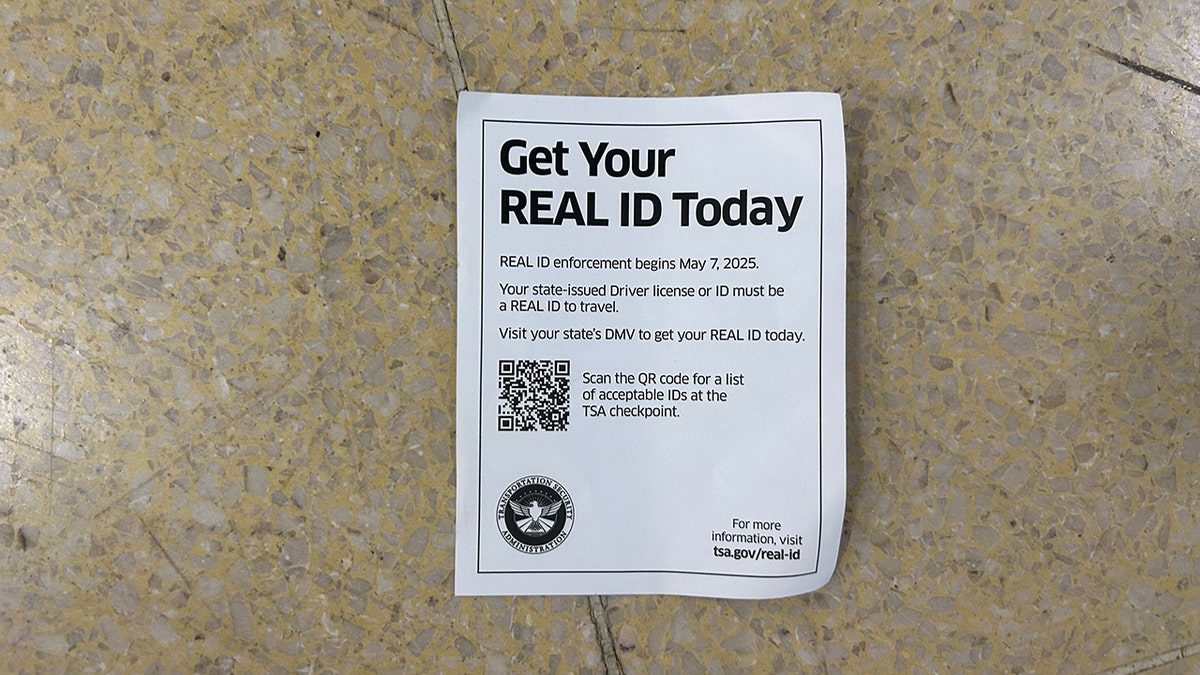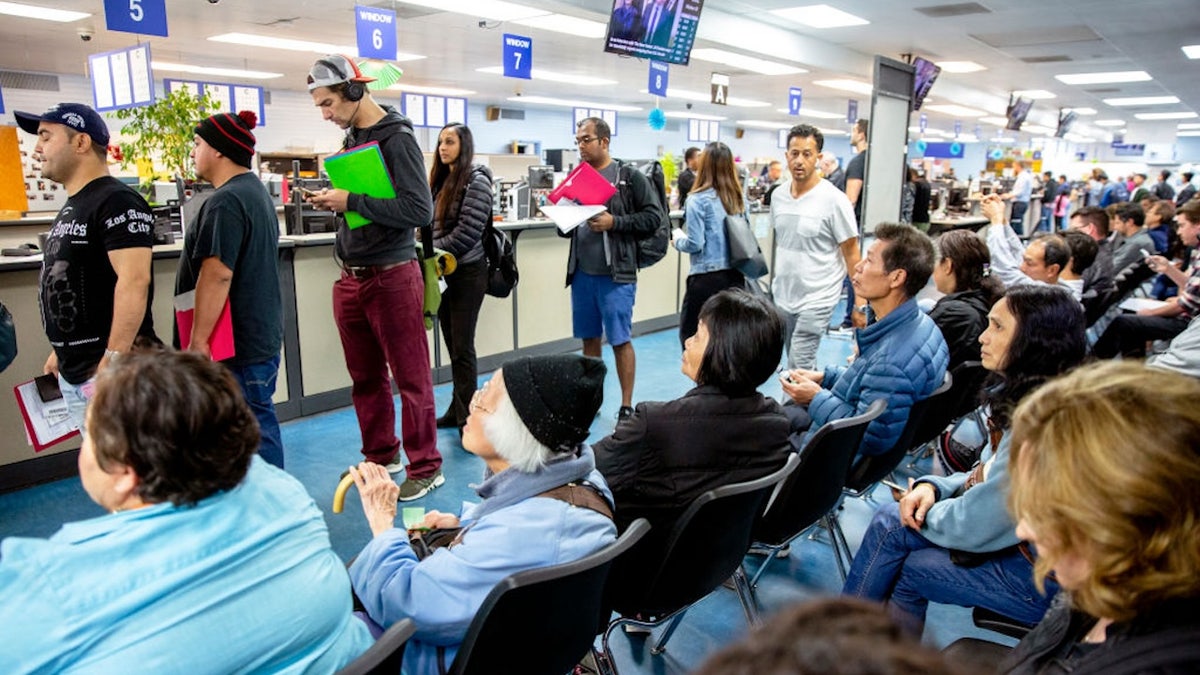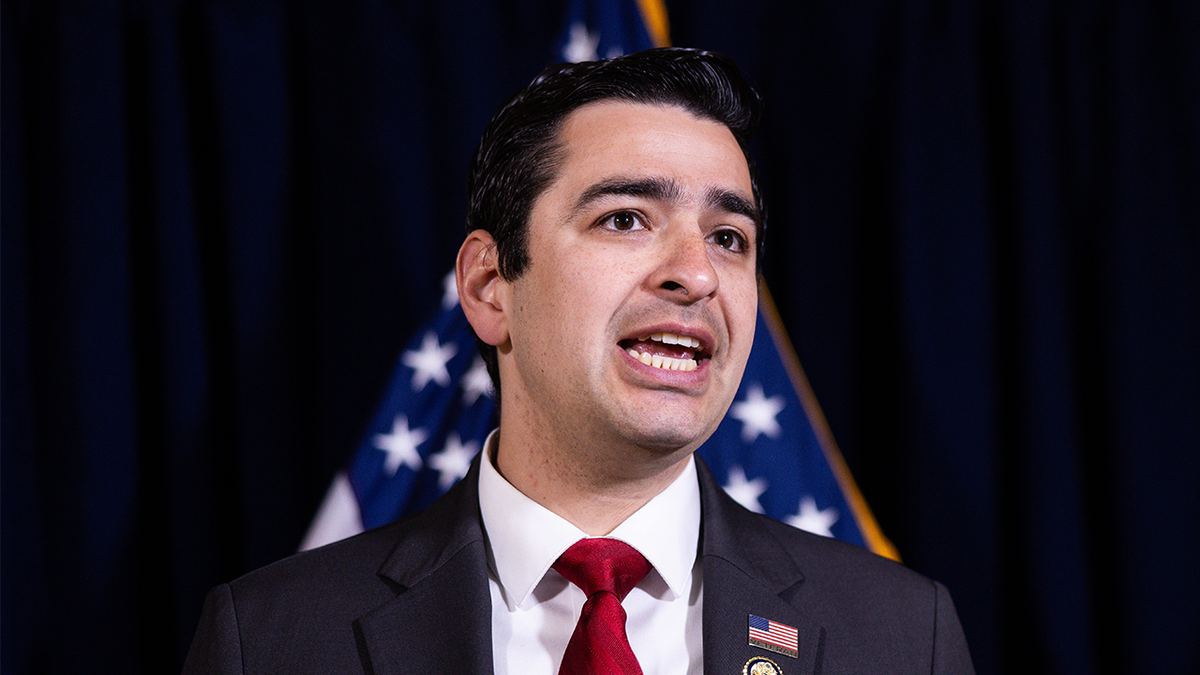INTERNACIONAL
REAL ID renews America’s age-old dread of the DMV

A stricter identity verification requirement for U.S. residents is slated to take force next week after 20 years of delay. And for many, the law will require a visit to one of the nation’s most notorious, time-honored places of dread: the Department of Motor Vehicles.
These facilities can vary slightly both in name and in acronym: Texans, for example, have a Department of Public Safety or DPS; Floridians dub theirs the Department of Highway Safety and Motor Vehicles or HSMV. (Add to the mix the DDS, the BMV and the MVD, it’s a veritable alphabet soup.)
Despite the different names, each of these state-run facilities serves the same purpose: to license drivers and issue identification cards to residents living in the state. They share the same wait times and inspire the same feelings of burden and loathing.
But for individuals in some states, things are about to get a lot worse, fast.
‘DRACONIAN’ AND DANGEROUS: FORMER TRUMP NAT SEC ADVISOR SOUNDS ALARM ON BIDEN-ERA DOJ’S PLANS FOR GOOGLE
People wait in line at the Department of Motor Vehicles in San Francisco on May 11, 2020. (David Paul Morris/Bloomberg via Getty)
On May 7, all U.S. residents will be required to show a «REAL ID-compliant» form of identification to board any flights, including international and domestic travel, or to enter any federal buildings in compliance with a long-stalled federal law passed by Congress in 2005.
A REAL ID is a state-issued driver’s license or state-issued identification card that meets certain federal standards, and it requires individuals to provide additional documentation, such as several documents proving current state residency – a utility agreement and lease, for example – as well as a certified birth certificate, among other things.
REAL IDs are now issued by all state DMVs (or BMVs or HSMVs) in anticipation of the fast-approaching enforcement date. REAL ID-compliant ID cards and licenses are marked with a star or other symbol in the right-hand corner, and some states, including Texas and Florida, have been issuing them for years.
But because DMVs are operated at a state and not federal level, compliance with the tighter verification standards has until recently been optional. That’s prompted a patchwork of compliance across the U.S. and a recent, frenzied panic from residents in states whose DMVs have not met the REAL ID standards.
NEED REAL ID IN A HURRY? HERE ARE SOME OPTIONS OUTSIDE THE DMV

REAL ID enforcement begins May 7, 2025. (Fox News)
In the final days before the new law takes effect, some U.S. residents are learning for the first time, to their horror, that their IDs are not up to snuff.
That’s prompted a surge of last-minute appointments in some states as drivers frantically look to obtain these new IDs. In others, appointments are nearly impossible to come by.
New Jersey, for example, currently has no appointments available at any of its DMV facilities in the state. That could be a major problem for travelers in the Garden State, whose REAL ID compliance is the lowest in the country at 17% last month, according to data compiled by CBS News.
Other nearby states are reporting similar compliance rates, with Pennsylvania at 26% compliance and New York with 43%, which is less than half of all residents living in the state.
For individuals in these states, the REAL ID compliance standards amount to what could be a travel nightmare, especially ahead of the summer holiday season when airports brace for a sharp uptick in traffic.
As of January 2024, just 56% of state-issued drivers’ licenses and identification cards were compliant with the new REAL ID requirements, according to DHS estimates. It’s unclear how much that percentage has changed in the last year.
«DHS anticipates that a significant number of individuals seeking to use their DL/ID for a REAL ID official purposes on and after May 7, 2025, may not have a compliant DL/ID,» the agency said in a memo last September.

Dozens wait in line at the San Francisco Department of Motor Vehicles on July 23, 2019. (Getty Images)
In January, DHS issued a slightly more optimistic projection in the Federal Register, anticipating that by May 7, up to 66% of U.S. ID holders would have the new legally required ID.
But in the final days before the law takes force, it’s hard to ascertain exactly where things stand. Horror stories persist in some states of drivers struggling to obtain the new ID, and in others, state lawmakers are hoping to be granted a delay.
In Kentucky, a group of state lawmakers led by Senate Transportation Committee Chair Jimmy Higdon, R-Lebanon, urged DHS Secretary Kristi Noem to delay the REAL ID enforcement date, citing «growing concerns» from state residents who have been unable to access driver’s licensing services due to «limited appointment availability and long lines for walk-ins.»
«This simple request is to protect Kentuckians from bureaucratic burdens,» Higdon said in the letter. «Rural residents, seniors, and families still have hurdles in front of them, and in a lot of cases, may not be aware of their options. Only about 40 percent of our residents have a REAL ID, but I would also like more time to help Kentuckians understand that they may not need a REAL ID. Kentucky has made a good faith effort, but we just aren’t there yet.»
TSA has warned that individuals who don’t have the right ID before that date could be subject to significantly longer wait times or other disruptions to travel. This could impact travel plans for millions of Americans ahead of what is expected to be a busy summer traveling season.
CLICK HERE TO GET THE FOX NEWS APP
Others could be barred from accessing certain federal buildings.
And the problem persists in other states as well: CBS News found in its April survey that at least 17 states have compliance rates of 50% or less, with 30 states at less than 70% compliance.
Politics,Donald Trump,Immigration,Border security,Homeland Security
INTERNACIONAL
Chile entregó archivos confidenciales a familiares de víctimas de la dictadura y anunció un banco público de ADN

El presidente de Chile, Gabriel Boric, encabezó este lunes la entrega oficial de archivos reservados a familiares de víctimas de la dictadura militar (1973–1990), en el marco de una política estatal que busca avanzar en verdad y justicia. Las denominadas “carpetas de calificación” contienen antecedentes que permitieron acreditar como víctimas a personas ejecutadas o desaparecidas durante el régimen de Augusto Pinochet.
“Esta documentación representa un patrimonio y parte de la memoria de las familias, la comunidad y el país en general”, señaló la Presidencia en un comunicado. El acto se llevó a cabo coincidiendo con el Día Internacional de los Archivos y forma parte del Plan Nacional de Búsqueda, una estrategia estatal inédita mediante la cual el Estado asume por primera vez la responsabilidad directa en la búsqueda de detenidos desaparecidos.
Los archivos entregados incluyen testimonios, informes, antecedentes personales y resoluciones administrativas recabados por la Comisión Nacional de Verdad y Reconciliación (conocida como Comisión Rettig) y la Corporación Nacional de Reparación y Reconciliación, organismos creados durante la transición democrática.

La documentación proviene tanto de organismos del Estado como de organizaciones de la sociedad civil, familiares de las víctimas y sobrevivientes. Este archivo fue declarado Monumento Nacional en 2022, por su relevancia histórica y simbólica.
Según cifras oficiales, la dictadura de Pinochet dejó al menos 3.200 muertos, de los cuales 1.469 corresponden a desapariciones forzadas. Hasta la fecha, se han identificado los restos de 307 personas, mientras que otras 1.162 continúan desaparecidas. Los antecedentes contenidos en las carpetas entregadas son clave para continuar esas investigaciones.
De forma paralela, el gobierno también anunció la creación de un banco público de ADN para facilitar la identificación de víctimas de las adopciones ilegales cometidas durante la dictadura, muchas de las cuales fueron orquestadas con la participación de funcionarios del Estado y actores del sistema de salud y justicia.

Organizaciones como la Fundación Hijos y Madres del Silencio exigen que el banco de ADN se implemente antes del fin del mandato de Boric, en marzo de 2026. “Es una medida muy importante, similar a lo que tienen las Abuelas de Plaza de Mayo en Argentina, pero queremos que realmente se cumpla”, señaló Marisol Rodríguez, vocera de la fundación, quien busca a su hermano, sustraído en un hospital de Santiago en 1972.
Las víctimas denuncian que fueron sedadas, engañadas o presionadas para entregar a sus hijos recién nacidos, en muchos casos bajo la falsa premisa de que habían fallecido. El sistema de adopciones ilegales involucró a médicos, matronas, jueces, notarios, autoridades migratorias y religiosos, y afectó principalmente a madres jóvenes y de escasos recursos. Se estima que alrededor de 20.000 menores fueron adoptados de manera irregular por familias extranjeras. De ellos, solo 1.000 han logrado reencontrarse con sus familias de origen, según datos del Poder Judicial.

El presidente Boric anunció la creación del banco genético en su reciente cuenta pública ante el Congreso, pero hasta ahora no se han detallado los plazos ni el funcionamiento del sistema. La medida permitiría a cualquier persona con dudas sobre su origen consultar la base genética de forma extrajudicial, sin necesidad de iniciar un proceso penal ni involucrar directamente a las familias adoptivas.
“Hay muchas personas apropiadas que no tuvieron un proceso legal de adopción y que no quieren involucrar a sus padres adoptivos, pero sí quieren saber quiénes son”, explicó Rodríguez. Otras afectadas, como María Inés Soto, expresaron escepticismo debido a intentos fallidos anteriores, como el proyecto impulsado en 2020 durante el segundo mandato de Sebastián Piñera, que no avanzó más allá de la recolección de unas pocas muestras de ADN.
El anuncio ocurre en una semana marcada también por un hito judicial sin precedentes: por primera vez, un juez chileno acreditó la existencia de una red de adopciones ilegales durante la dictadura y procesó a cinco personas por sustracción de menores. La investigación penal se abrió formalmente en 2018, cuatro años después de las primeras denuncias públicas.
“Yo pido a quien tenga información que nos la dé, para que todos nuestros hijos e hijas vuelvan”, declaró Nilda, otra madre que busca desde 1974 a su hija, presuntamente fallecida al nacer. “Me dijeron que estaba enferma, pero era una guagua sana. Se la llevaron para siempre”.
Con estas dos medidas —la entrega de archivos de víctimas del régimen y la creación del banco de ADN— el Estado chileno profundiza su responsabilidad en el esclarecimiento de crímenes de lesa humanidad y en la reparación de sus consecuencias, más de tres décadas después del fin de la dictadura.
(Con información de EFE)
South America / Central America,VALPARAISO
INTERNACIONAL
113 House Dems vote against GOP resolution to condemn Boulder attack on pro-Israel activists

NEWYou can now listen to Fox News articles!
More than 100 Democrats voted against a House GOP-led resolution to condemn the accused terror attack in Boulder, Colorado.
It passed 280-113, with 75 Democrats joining Republicans to vote for the bill. Six lawmakers, five Democrats and one Republican, voted «present.»
The legislation was introduced by Rep. Gabe Evans, R-Colo., last week in response to the attack. But Democrat lawmakers made clear they were opposed to language in the resolution that they felt was politically charged.
In addition to condemning the attack, Evans’ resolution also appeared to rebuke blue-leaning sanctuary jurisdictions that were at odds with federal immigration authorities, and he condemned illegal immigrants who overstay their visas as well.
A second bill, led by Reps. Jeff Van Drew, R-N.J., and Joe Neguse, D-Colo., more broadly condemned the rise in antisemitic attacks in the U.S. That legislation netted much wider bipartisan support, passing 400-0, with just two lawmakers voting «present.»
HOUSE GOP TARGETS ANOTHER DEM OFFICIAL ACCUSED OF BLOCKING ICE AMID DELANEY HALL FALLOUT
Police work at the scene after an attack that injured multiple people in Boulder, Colo., on June 1, 2025. (Reuters | Fox News Digital)
But Evans’ resolution more specifically noted that the case of terror suspect Mohammed Sabry Soliman, who overstayed a tourist visa and a subsequent work authorization, «demonstrates the dangers of not removing from the country aliens who fail to comply with the terms of their visas.»
The Egyptian national is facing federal charges after allegedly attempting to set fire to peaceful demonstrators who were protesting Hamas’ continued possession of Israeli hostages in Gaza.
The Trump administration has vowed that he and his family will be deported from the U.S.
Evans’ resolution also «affirms that free and open communication between State and local law enforcement and their Federal counterparts remains the bedrock of public safety and is necessary in preventing terrorist attacks» and it «expresses gratitude to law enforcement officers, including U.S. Immigration and Customs Enforcement personnel, for protecting the homeland.»
It comes as Democrat-controlled cities like Los Angeles and Nashville, Tennessee, have seen their leaders criticize the Trump administration’s ICE crackdown.
The Trump administration’s handling of anti-ICE riots in Los Angeles has spurred an outpouring of scorn from Democrat officials, particularly the decision to send National Guard troops in to break up the demonstrations.
House Minority Leader Hakeem Jeffries, D-N.Y., criticized Evans’ resolution in comments to reporters on Monday.

Rep. Gabe Evans led the resolution. (Tierney L. Cross/Getty Images)
«Who is this guy? He’s not seriously concerned with combating antisemitism in America. This is not a serious effort,» Jeffries said. «Antisemitism is a scourge on America. It shouldn’t be weaponized politically.»
Jeffries also called Evans «a joke.»
Evans responded on X, «I served our nation in uniform in the Middle East, as a cop in Colorado, & now as a Congressman. This wildly offensive sentiment from Democrat’s Leader is why antisemitism persists. The Left is unserious about finding real solutions.»
Rep. Dan Goldman, D-N.Y., who is Jewish, also criticized Evans’ resolution.
MEET THE TRUMP-PICKED LAWMAKERS GIVING SPEAKER JOHNSON A FULL HOUSE GOP CONFERENCE
«You weren’t here, Mr. Evans, last term, but there were about 10 antisemitism resolutions that effectively said the same thing solely to score political points. We Jews are sick and tired of being used as pawns,» Goldman said during debate on the bill.
CLICK HERE TO GET THE FOX NEWS APP
But Van Drew, who is leading a bipartisan resolution that similarly condemns antisemitism but does not discuss immigration, defended Evans’ measure.
«Yes, it is different than mine. Mine focused purely on antisemitism here in the world. But he brings up a valid point not only for Jews, but for many innocent victims. Whether it was Laken Riley, whether it was the women that were raped, the women and men that were killed, those that were beaten, those that were hurt, who were in law enforcement. Illegal immigration is not a good thing,» Van Drew said.
The two lawmakers who voted «present» on Van Drew’s resolution were Reps. Rashida Tlaib, D-Mich., and Marjorie Taylor Greene, R-Ga.
Greene wrote on X after the vote, «Antisemitic hate crimes are wrong, but so are all hate crimes. Yet Congress never votes on hate crimes committed against white people, Christians, men, the homeless, or countless others. Tonight, the House passed two more antisemitism-related resolutions, the 20th and 21st I’ve voted on since taking office. Meanwhile, Americans from every background are being murdered — even in the womb — and Congress stays silent.»
INTERNACIONAL
Brasil: comenzaron los interrogatorios a Jair Bolsonaro y sus colaboradores, acusados de intento de golpe de Estado

Los otros acusados
Brasil,Lula Da Silva,Jair Bolsonaro
-

 POLITICA2 días ago
POLITICA2 días agoCristina Kirchner advirtió que la pueden “meter presa” y lo relacionó con su candidatura a diputada provincial
-

 POLITICA2 días ago
POLITICA2 días agoDetuvieron a Juan Grabois por la toma del Instituto Perón, cerrado por el gobierno de Milei
-

 DEPORTE2 días ago
DEPORTE2 días ago¿Dónde ver EN VIVO y ONLINE el Portugal vs. España por la final de la Nations League?






























